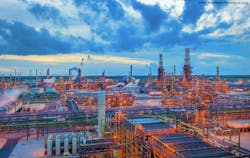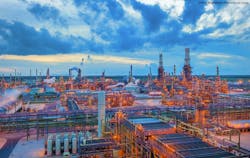Marathon lets contract for ULSD project at Garyville refinery
Marathon Petroleum Corp. has let a long-term contract to Praxair Inc., Danbury, Conn., to supply hydrogen to support an ultralow-sulfur diesel (ULSD) project at its 539,000-b/d refinery at Garyville, La.
Praxair will deliver hydrogen through its existing pipeline network in southeast Louisiana for the refinery’s ULSD project, which is planned for 2018, the industrial gas supplier said.
Praxair disclosed no details regarding the value, specific duration, or volume of hydrogen to be delivered as part of the contract.
Scheduled to be completed by yearend 2018, Marathon’s proposed $120-million ULSD project at Garyville intends to increase the refinery’s production of ULSD by 10,000 b/d, the company said in its latest general presentation to investors dated November 2016.
Unfavorable market conditions in late 2015 previously led Marathon to cancel a proposed $2.2-2.5-billion residual oil upgrade expansion at the Garyville refinery (OGJ Online, Oct. 30, 2015).
Related projects
The Garyville ULSD project joins a series of other initiatives related to Marathon’s ongoing planned investment of about $475 million to enhance margins across its entire refining system.
In addition to the ULSD project, Marathon also has outlined a $220-million budget for upgrading works at the Garyville refinery’s fluid catalytic cracker (FCC) to boost the manufacturing site’s output of alkylate and light products, the company said.
Started in third-quarter 2016, the Garyville FCC-alkylation revamp was targeted for completion by yearend, Ray Brooks, Marathon’s senior vice-president for refining, said in the company’s quarterly earnings call on Oct. 27.
A similar $40-million FCC-alkylation project also is slated at Marathon’s 132,000-b/d refinery in Detroit, Mich., while another $95-million investment is earmarked for projects designed to expand ULSD export capacity at the 459,000-b/d Galveston Bay, Tex., refinery (30,000 b/d ULSD by late 2016; 115,000 b/d of gasoline, ULSD in 2019).
Texas refinery integration
Separately, Marathon continues to advance a previously announced program to fully integrate its Galveston Bay refinery with the operator’s nearby 86,000-b/d refinery at Texas City, Tex.
First announced in fourth-quarter 2015, the South Texas Asset Repositioning (STAR) program includes a series of staged project investments at the Texas refineries that, alongside expanding crude processing capacity and enhancing reliability, also involve works to increase processing of residual oil, production of ULSD, and recovery of distillates and gas oil, Marathon said.
Scheduled to be completed in 2021 at a cost of $1.5-2 billion, the STAR program will in result in an integrated Galveston Bay-Texas City refining complex (the Galveston Bay refinery) equipped with the following capacities: crude distillation, 585,000 b/d; vacuum distillation, 225,200 b/d; residual hydrocracking, 94,300 b/d; coking, 29,800 b/d; catalytic cracking, 184,800 b/d; catalytic reforming, 124,300 b/d; catalytic hydrocracking, 65,600 b/d; catalytic hydrotreating, 452,900 b/d; alkylation, 51,800 b/d; ROSE–Solvent deasphalting, 18,000 b/d; aromatics, 33,800 b/d; selective toluene disproportionation, 60,800 b/d; coke, 2,263 short tons/day; and sulfur, 1,351 long tons/day.
Contact Robert Brelsford at [email protected].

